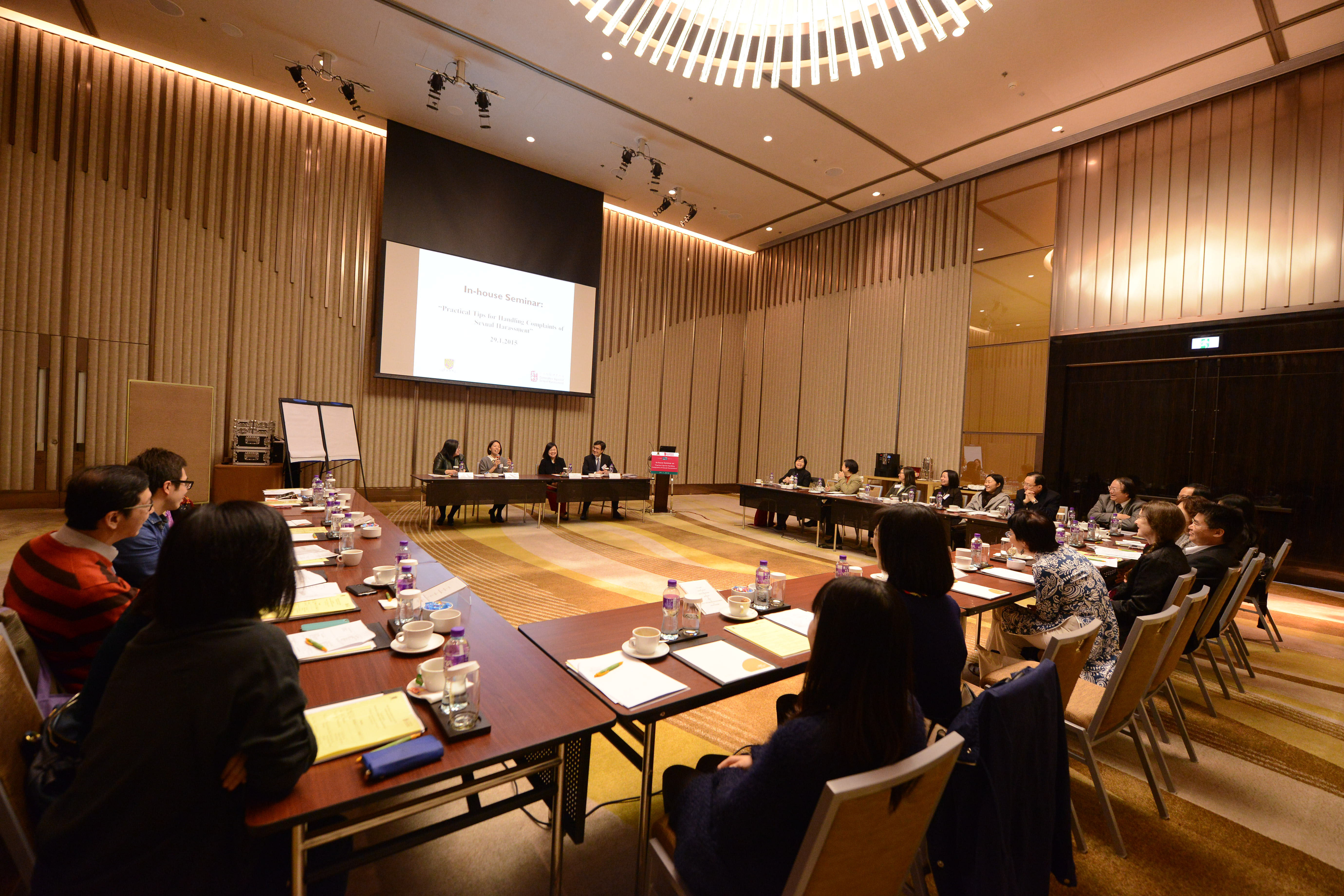The University is committed to eliminating and preventing sexual harassment and will not condone any act of sexual harassment committed by its staff members or students. The University has procedures to deal with allegations or complaints of sexual harassment and to provide proper redress if and when sexual harassment occurs.
There are three stages to the complaints procedures:
Stage 1 Advising and Early Resolution
Stage 2 Conciliation
Stage 3 Formal Investigation
Stages 1 and 2 are both informal procedures. The complainant may elect to bypass conciliation and proceed directly with formal investigation.
Stage 1 Advising and Early resolution
The designated officers of the Panel Against Discrimination and Sexual Harassment are available to address your concern with a view to clarifying whether the alleged behaviour might constitute sexual harassment. The officers can assist you by:
| • |
Clarifying what has occurred and whether the behaviour might constitute sexual harassment under the University's policy; |
| • |
Providing information about the policy and the complaint procedures; |
| • |
Advising of your rights under the relevant laws and regulations; |
| • |
Explaining conciliation and complaint investigation procedures under the policy; and |
| • |
Providing information and advice about where you can go to get more help and support, e.g. counselling service. |
Stage 2 Conciliation
What is conciliation?
Conciliation is a voluntary process. It will only be arranged where both the complainant and the complainee are willing to take part in the conciliation. If the parties reach a settlement, the agreement signed by the parties is legally binding. Under normal circumstances, attempts at conciliation do not require the filing of a written complaint.
Who will conciliate sexual harassment?
The Panel Against Discrimination and Sexual Harassment will offer to facilitate conciliation of a dispute upon request of the complainant or the complainee. The Panel Convenor will appoint two panellists of different gender to conduct conciliation. The Secretary of the Committee Against Discrimination and Sexual Harassment will act as Secretary of the conciliation team.
What role will a conciliation team play?
The conciliation team will serve as facilitator to help the parties identify issues, explore possible ways to resolve the dispute, and help them reach an agreement that both find satisfactory. The team will interview the complainant and the complainee separately. In the conciliation process, no meeting notes will be taken.
What are the possible outcomes of conciliation?
If the conciliation fails to reach a settlement, the complainant can continue to enforce his/her rights. If a settlement has been reached during the conciliation, the parties may enter into a legally binding agreement to record the terms of the settlement. The settlement can contain:
• an apology;
• a guarantee that no further offending behaviour will occur;
• a statement that the parties will have no further contact with each other; and
• an agreed procedure for monitoring the situation and resolving any future concerns.
Each party will sign the agreement and keep a copy. Information about the complaint and resolution including a copy of the agreement will be kept in the office of the Secretary of the Committee Against Discrimination and Sexual Harassment for purpose of record and shall be dealt with by all the parties concerned in strict confidence and in accordance with the University's existing policies and applicable laws.
Will the conciliation team monitor the performance of the agreement?
No. But the conciliation team would inform the parties that if a breach occurs, the complainant has the right to file a written complaint pursuing a formal investigation.
Stage 3 Investigation
What is investigation?
Investigation is a formal procedure. If the complainant wishes the University to initiate an investigation into an act of sexual harassment, he/she should file a written complaint with the Panel Against Discrimination and Sexual Harassment.
Upon receipt of a written complaint, the Panel Convenor will appoint at least two panellists of different gender to investigate the complaint. The Secretary of the Committee Against Discrimination and Sexual Harassment will be appointed as Secretary of the Investigation Team. No member of the Investigation Team should be from the department/unit in which the complainant or the complainee works.
Under special circumstances as deemed necessary by the Panel Convenor, a non-staff Council member, an external member or a student representative may be invited to join the Investigation Team to assist the process and secure the confidence of the parties. In cases in which both parties are students, the Investigation Team shall include a student representative wherever possible.
You will be given a copy of the complaint by the Investigation Team and will be provided with an opportunity to respond to the allegation. The Secretary will contact you to make sure that you understand the procedures concerned. The Investigation Team will interview you and the complainant separately. The complainant will usually be interviewed first. If necessary, witnesses and any other parties concerned will also be interviewed individually in conformance with the privacy and confidentiality laws.
What role will an Investigation Team play?
The Investigation Team will conduct a full and impartial investigation to determine whether the complaint can be substantiated. Upon completion of the investigation, the Investigation Team will submit a fact-finding report to the Panel Convenor. The Investigation Team would not play any role in recommending sanction, penalty, or disciplinary action which will rest on the relevant disciplinary committee(s).
What are the possible outcomes of an investigation?
The Panel Convenor shall review the fact-finding report submitted by the Investigation Team and notify both the parties concerned in writing of the fact-finding report. If the decision of the Investigation Team is that the allegation of sexual harassment is established, then you may submit an appeal to the Panel Convenor. If the decision is that the allegation of sexual harassment is not established, then the complainant may submit an appeal to the Panel Convenor. If there is no appeal, the Panel Convenor shall report the matter to a Pro-Vice-Chancellor designated to handle matters relating to sexual harassment ("the designated Pro-Vice-Chancellor").
If there is a finding of sexual harassment, and that finding is not appealed, or upheld on appeal, then the Panel Convenor shall make a recommendation to the designated Pro-Vice-Chancellor on disposal of the case and submit a final report to the designated Pro-Vice-Chancellor for consideration. The designated Pro-Vice-Chancellor shall convey his/her decision in writing to the complainant and the complainee.
What will be your right to appeal against the decision of the Investigation Team?
If the decision of the Investigation Team is that the allegation of sexual harassment is established, you will have the right to appeal in writing to the Panel Convenor. Upon receipt of an appeal, the Panel Convenor will establish an Ad Hoc Panel to review the fact-finding report, taking into account the written appeal stated in the your written submission ("Grounds of Appeal"). The Ad Hoc Panel shall include a panel of three members of the Panel Against Discrimination and Sexual Harassment who have not had any prior involvement in the case. Their decision on the facts will be final, and will be reported to the Panel Convenor.
Will you have the right to appeal to the Vice-Chancellor?
Yes. You may submit a written appeal to the Vice-Chancellor on the designated Pro-Vice-Chancellor's specific decision on the disposal of the case, but may not appeal to the Vice-Chancellor against the findings of the Ad Hoc Panel.






